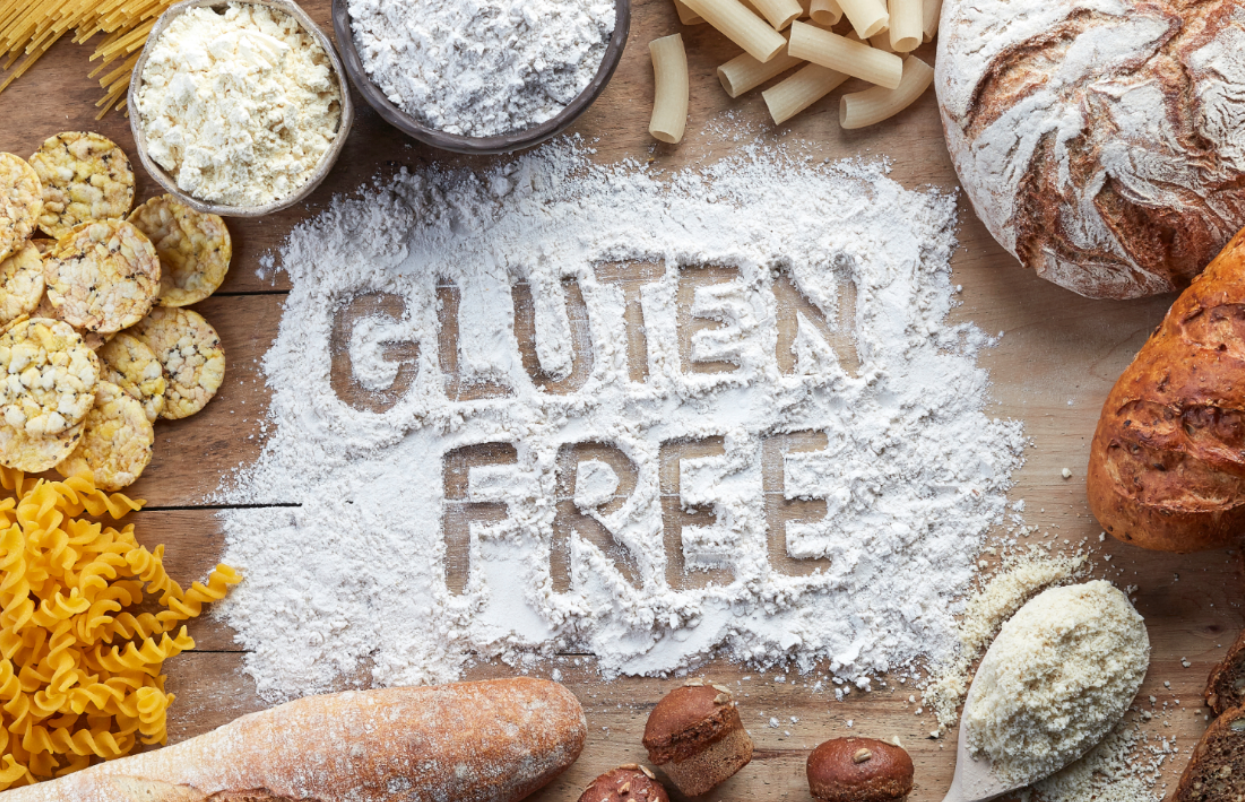What is gluten and what does gluten-free mean?
If you’re wondering whether a gluten-free diet is right for you, look no further.
Gluten is a mixture of several proteins divided into two groups called gliadins and glutenins. Gluten can be mainly found in several, but not all, grains such as wheat, barley, rye, and cereals. It essentially acts as a glue that helps certain foods maintain their shape. [1]
As people become more aware of gluten intolerance, gluten-free options have become more widely available to people in both grocery stores and restaurants, however, buying a product with a gluten-free label at the grocery does not guarantee the complete absence of gluten.
Currently, in the U.S. a gluten-free label technically allows the presence of gluten in the product as long as it remains fewer than 20 parts per million (ppm). This limit was set due to evidence indicating that individuals with some form of gluten intolerance would not likely experience a negative response at this level. [2]
When undergoing a gluten-free diet, you may want to avoid foods that contain high contents of gluten such as:
- Wheat-based foods (bread, pasta, cereal)
- Beer or flavored alcoholic beverages
- Rye
- Barley
- Pastries
- Snacks (candy, roasted nuts, pretzels, chips)
Who should avoid gluten?
You may have heard people label those who order gluten-free  dishes at restaurants as “picky eaters” but this may not always be the case. Approximately 1% of the US population lives with celiac disease, gluten ataxia or wheat allergies. [3][4]
dishes at restaurants as “picky eaters” but this may not always be the case. Approximately 1% of the US population lives with celiac disease, gluten ataxia or wheat allergies. [3][4]
Celiac disease: an autoimmune disorder that triggers an immune reaction causing damage in the lining of the small intestine. Over time this can damage the process of nutrient absorption from food.
Gluten ataxia: an autoimmune disorder that affects specific nerve tissues leading to problems with voluntary muscle movement
Non-celiac gluten sensitivity: Individuals experience similar symptoms as those with celiac disease such as bloating, diarrhea, abdominal pain, constipation and headaches. Although the immune system is involved the small intestine is not damaged
Wheat allergy: similar to other food allergies, the immune system mistakes gluten as a disease-causing agent. The immune system produces antibodies for the protein in gluten which begins the immune system response. Symptoms may include breathing difficulties and congestion.
Celiac disease is the most severe form of gluten intolerance. When people with celiac disease consume foods with gluten, their intestinal tracts become damaged from inflammation which affects their ability to absorb nutrients from food.
Digestive: abdominal pain, diarrhea, constipation, digestive tissue inflammation
Neurological: fatigue, lack of focus, confusion, anxiety, difficulty speaking
Skin: eczema, inflammation, rash
Other: Weight loss & poor appetite, growth delay among children, reduced immune function, anemia
How do I know if I can’t eat gluten?
Unfortunately, there is no set test that can determine if you have a non-celiac gluten sensitivity. Since there is no agreed-upon method, many people opt for celiac testing, however, a negative  test result for celiac disease does not mean you are free from every other form of gluten intolerance.
test result for celiac disease does not mean you are free from every other form of gluten intolerance.
Currently, there are several types of tests that can be used to diagnose celiac disease. The most common form is blood testing. This test looks for certain antibodies higher in people with celiac disease, and when interpreted can tell you if you should avoid gluten or have no problem consuming it.
In order for the blood test to be accurate, you must be on a gluten diet. This facilitates the detection of certain antibodies that would normally be present in elevated levels in people who have celiac disease.
Why are gluten-free diets popular?
Despite the rarity of this disease, many people in the US have adopted the gluten-free lifestyle over the last 3 decades. With over $15.5 billion spent on gluten-free diets in 2016 alone, manufacturers have aggressively marketed the benefits of living a gluten-free lifestyle to the general public.
Many people have claimed an increase in energy, weight loss, improved health, and prevention of disease. Additional research is needed since none of these claims have been specifically proven for individuals free of gluten intolerances.
Do not underestimate the power of marketing. Products with little to no scientific evidence can and have been sold for years.
So a gluten-free diet can’t hurt?
Yes and no.
Although many people perceive gluten diets as “healthier”, this simply just isn’t true.
Gluten-free foods typically have fewer nutrients. Nutrient deficiencies in gluten-free foods may include:
Minerals: zinc, iron, calcium
Vitamins: A, B12, D, E, K, folate
Due to gluten-free foods typically being less nutrient-dense, many health care providers are concerned it can harm an individual’s health who abruptly undergoes this change in diet without a medical purpose.[7] Pregnant women who undergo gluten-free diets are also a concern since B vitamins such as folic acid are crucial for the development of their baby.[8]
Following a gluten-free diet can definitely affect weight loss. Due to the food restrictions and decreased nutritional value in gluten-free foods, this diet may cause weight loss. Weight loss can be mainly attributed to replacing many gluten-containing grains with other gluten-free options, resulting in a caloric deficit.
Before you get too excited and go on a gluten-free diet yourself, you should know the gluten-free lifestyle also has the potential to cause weight gain. In order for gluten-free foods’ taste to appeal to consumers, many manufacturers often go to lengths of adding additional fat or sugar to make their products taste better. If you know your macros, you will know that adding fat and sugar to your diet means adding more calories which results in – you guessed it. Weight gain!
Currently, there is no evidence that exists to support the idea that a gluten-free diet will improve your health or prevent other types of diseases if you aren’t already suffering from gluten intolerance or allergies.
Aside from the nutritional challenges a gluten-free diet presents, your wallet may also take a hit. On average, gluten-free products have been found to be 242% more expensive than regular gluten-containing foods.[9]
If you don’t have a form of gluten intolerance, this is great. You don’t need to stress about the presence of gluten in your diet. If you suffer from gluten intolerance, celiac disease, or gluten-related allergies, a gluten-free diet can definitely benefit your health.
PHF on the subject
- Gluten contains several proteins that can be found in many grains
- Consuming gluten can often result in mild to severe symptoms for people who are intolerant, allergic or have celiac disease
- Gluten-free diets have become increasingly popular through false advertising and an increase of awareness for celiac disease, gluten intolerance, and allergies
- Gluten-free diets have less nutritional value and are more expensive than a gluten-containing diet
Now that you know gluten-free diets aren’t what many people make it seem you won’t be fooled if you find a social media influencer, a famous athlete or celebrity promoting a gluten-free diet promising miraculous results.
The idea of avoiding gluten in otherwise healthy individuals to provide health benefits and prevent future disease is a great way for manufacturing companies to promote their food. If you can consume gluten without a problem but decide to follow a more expensive diet with less nutritional content, you may find yourself asking – why bother?
Despite being able to consume gluten, you can always practice being mindful of other people’s diet restrictions and do your best to educate yourself on situations affecting others and not necessarily always yourself.
As always, if you suspect you have any form of gluten intolerance, allergies or celiac disease, consult with your doctor before you begin a gluten-free lifestyle.

